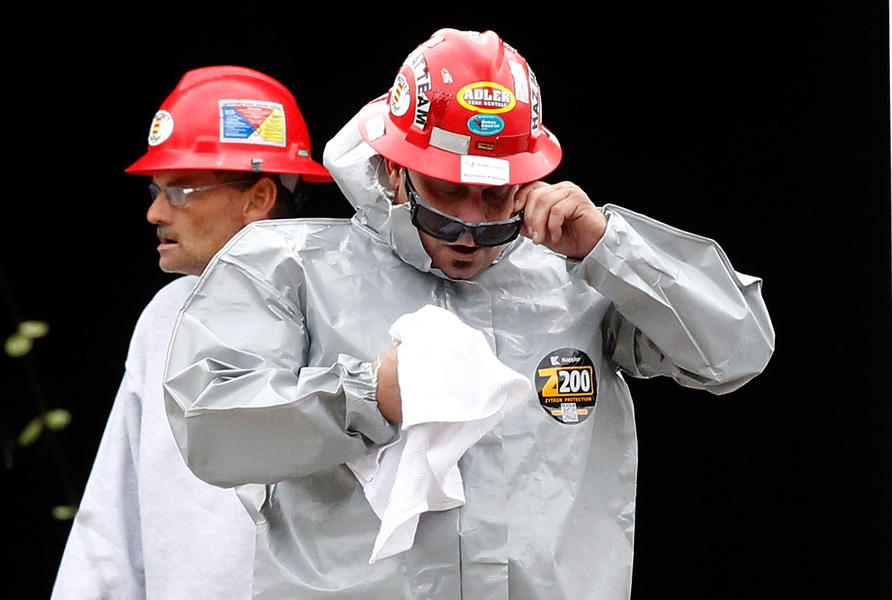Majority of Americans think the U.S. is prepared for an Ebola outbreak


A free daily email with the biggest news stories of the day – and the best features from TheWeek.com
You are now subscribed
Your newsletter sign-up was successful
Americans are very aware of the Ebola outbreak in West Africa and the few cases in the U.S., and a pretty narrow majority believe the U.S. is ready to handle Ebola, according to a new Wall Street Journal/NBC News poll. Fifty-six percent of respondents said the U.S. is somewhat or very prepared for an Ebola outbreak, versus 44 percent who said the nation isn't prepared well enough, including 20 percent who agreed the U.S. is not prepared "at all."
There were partisan differences: 61 percent of Democrats, 54 percent of independents, and 52 percent of Republicans said the U.S. is prepared for an outbreak, while 57 percent of Tea Party supporters said the U.S. is not prepared. People with more education had more confidence, and rural respondents had less. A plurality of respondents, 49 percent, had positive feelings about the Centers for Disease Control and Prevention, the lead agency handling Ebola in the U.S., versus 22 percent who expressed negative views of the CDC.
The most surprising finding was that practically every respondent knew about the West Africa outbreak (98 percent) and the case of Liberian national Thomas Eric Duncan, who died of the disease in Dallas (97 percent). "Those are the top two most recognized news stories during President Barack Obama's tenure in office," NBC News says, "even more widely known than the ISIS beheadings of Western journalists (94 percent) and the Travon Martin shooting (91 percent)." The poll was conducted Oct. 8-12.
The Week
Escape your echo chamber. Get the facts behind the news, plus analysis from multiple perspectives.

Sign up for The Week's Free Newsletters
From our morning news briefing to a weekly Good News Newsletter, get the best of The Week delivered directly to your inbox.
From our morning news briefing to a weekly Good News Newsletter, get the best of The Week delivered directly to your inbox.
A free daily email with the biggest news stories of the day – and the best features from TheWeek.com
Peter has worked as a news and culture writer and editor at The Week since the site's launch in 2008. He covers politics, world affairs, religion and cultural currents. His journalism career began as a copy editor at a financial newswire and has included editorial positions at The New York Times Magazine, Facts on File, and Oregon State University.
-
 Why are election experts taking Trump’s midterm threats seriously?
Why are election experts taking Trump’s midterm threats seriously?IN THE SPOTLIGHT As the president muses about polling place deployments and a centralized electoral system aimed at one-party control, lawmakers are taking this administration at its word
-
 ‘Restaurateurs have become millionaires’
‘Restaurateurs have become millionaires’Instant Opinion Opinion, comment and editorials of the day
-
 Earth is rapidly approaching a ‘hothouse’ trajectory of warming
Earth is rapidly approaching a ‘hothouse’ trajectory of warmingThe explainer It may become impossible to fix
-
 Trump HHS slashes advised child vaccinations
Trump HHS slashes advised child vaccinationsSpeed Read In a widely condemned move, the CDC will now recommend that children get vaccinated against 11 communicable diseases, not 17
-
 FDA OKs generic abortion pill, riling the right
FDA OKs generic abortion pill, riling the rightSpeed Read The drug in question is a generic version of mifepristone, used to carry out two-thirds of US abortions
-
 RFK Jr. vaccine panel advises restricting MMRV shot
RFK Jr. vaccine panel advises restricting MMRV shotSpeed Read The committee voted to restrict access to a childhood vaccine against chickenpox
-
 Texas declares end to measles outbreak
Texas declares end to measles outbreakSpeed Read The vaccine-preventable disease is still spreading in neighboring states, Mexico and Canada
-
 RFK Jr. shuts down mRNA vaccine funding at agency
RFK Jr. shuts down mRNA vaccine funding at agencySpeed Read The decision canceled or modified 22 projects, primarily for work on vaccines and therapeutics for respiratory viruses
-
 Measles cases surge to 33-year high
Measles cases surge to 33-year highSpeed Read The infection was declared eliminated from the US in 2000 but has seen a resurgence amid vaccine hesitancy
-
 Kennedy's vaccine panel signals skepticism, change
Kennedy's vaccine panel signals skepticism, changeSpeed Read RFK Jr.'s new vaccine advisory board intends to make changes to the decades-old US immunization system
-
 Kennedy ousts entire CDC vaccine advisory panel
Kennedy ousts entire CDC vaccine advisory panelspeed read Health Secretary RFK Jr. is a longtime anti-vaccine activist who has criticized the panel of experts
